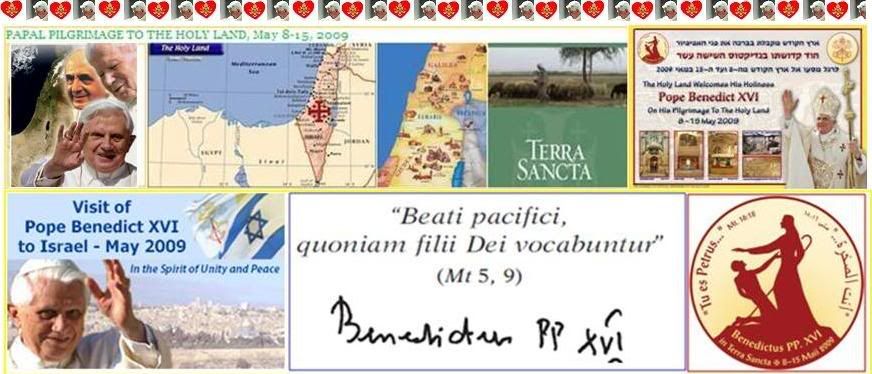 Pope Benedict ends Mideast tour
Pope Benedict ends Mideast tour
with visit to the Holy Sepulcher

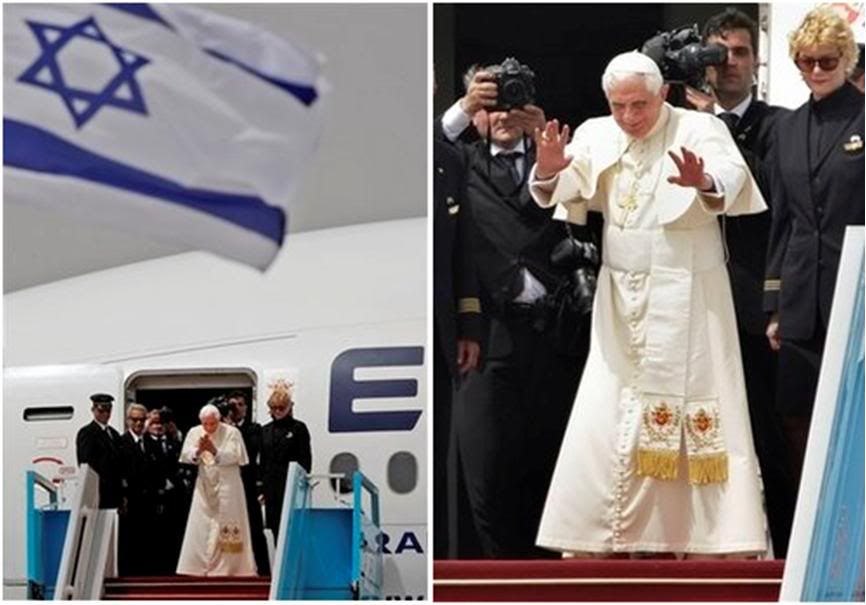
JERUSALEM, May 15 - Pope Benedict XVI assured his followers in the Holy Land that peace is possible, as he ended his Mideast visit Friday by putting aside the contentious issues he has confronted and coming as a pilgrim to the site of Jesus' crucifixion.
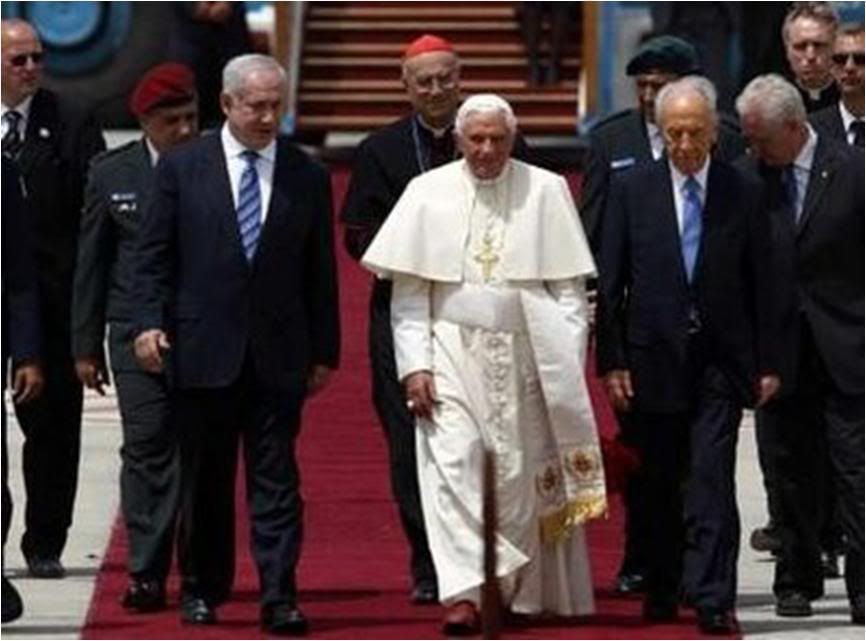
Before boarding an airplane for Rome at Israel's international airport later in the day, the Pope appeared to address some of the criticism leveled at him for a speech on the Holocaust that some Israelis felt was lukewarm. He also called Israel's West Bank separation barrier "one of the saddest sights" of his visit.
"No more bloodshed. No more fighting. No more terrorism. No more war," the pope said before departing.
Earlier on the fifth and final day of his visit, the pontiff walked into the Church of the Holy Sepulcher in Jerusalem accompanied by a traditional escort of men in black robes and red fezzes rhythmically banging staffs on the ground to announce his approach.
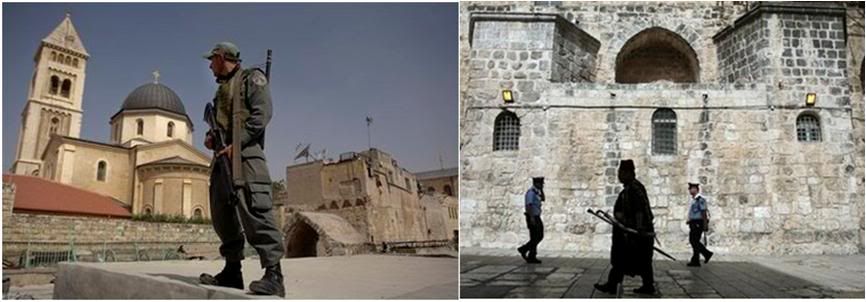
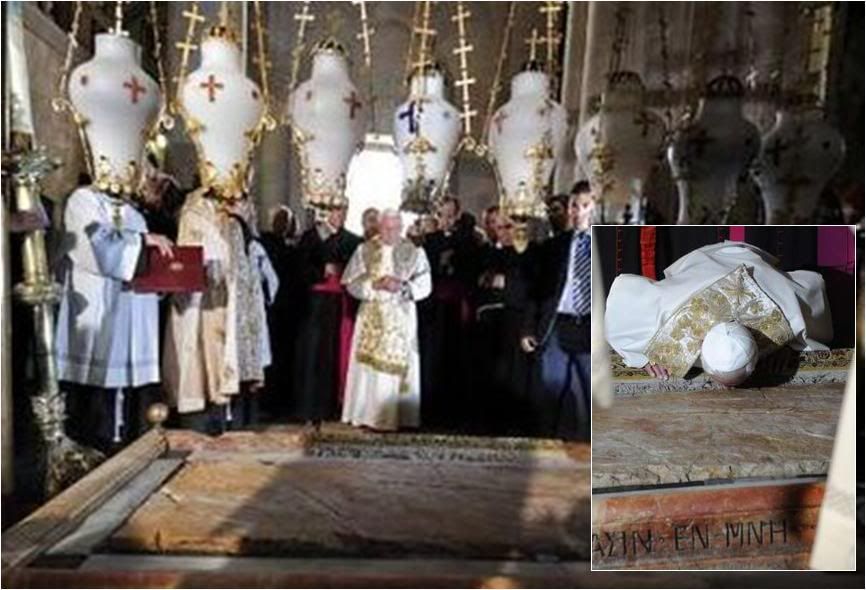
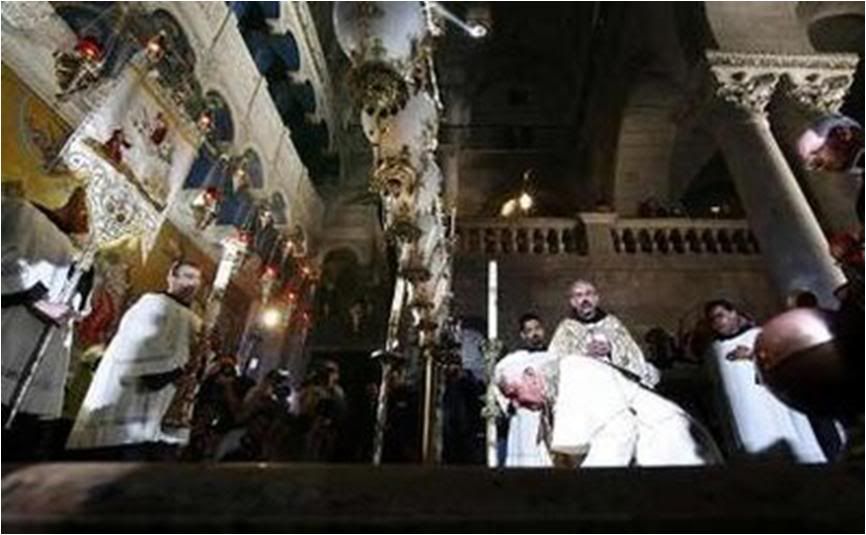
Benedict knelt down and kissed the rectangular stone on which Jesus's body is believed to have been placed after the crucifixion. Then he entered the structure inside the church marking the site of Jesus's tomb and knelt inside alone for several minutes, hands clasped, as priests chanted nearby. [No photos of this available yet.]
In a speech afterward, he told those gathered in the church not to lose hope — a central theme during a visit in which he addressed the Holocaust, Israeli-Palestinian politics and the shrinking number of Christians in the region.
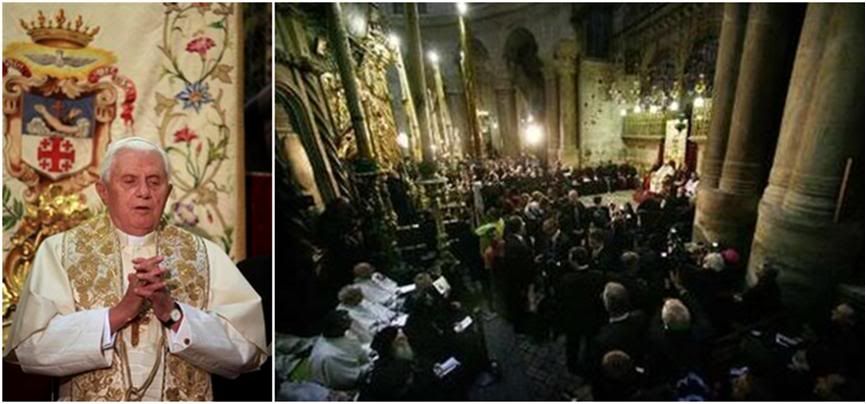
"The Gospel reassures us that God can make all things new, that history need not be repeated, that memories can be healed, that the bitter fruits of recrimination and hostility can be overcome, and that a future of justice, peace, prosperity and cooperation can arise for every man and woman, for the whole human family, and in a special way for the people who dwell in this land so dear to the heart of the Savior," he said.
With those "words of encouragement," he said, "I conclude my pilgrimage to the holy places of our redemption and rebirth in Christ."
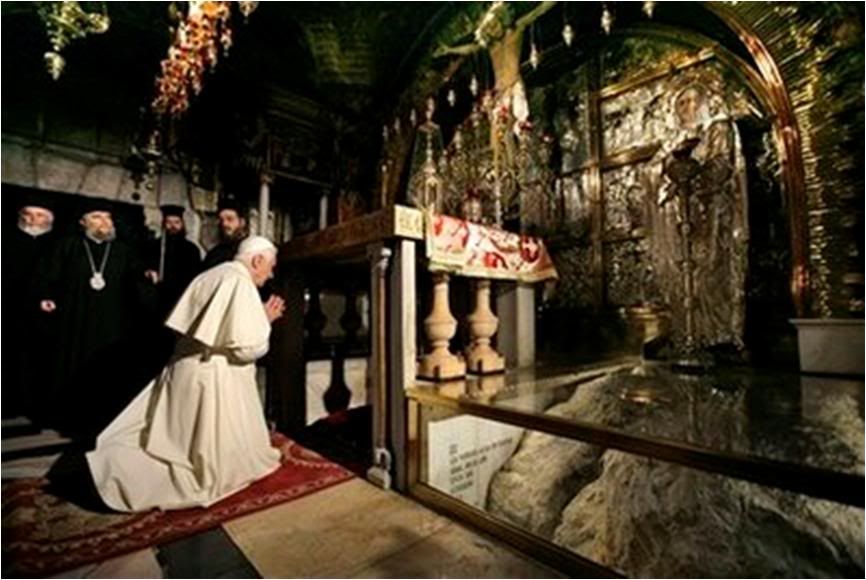
He then ascended to the second-floor Chapel of Golgotha (Calvary) next to the rock on which Jesus was crucified and knelt in silent prayer some time.
Thousands of soldiers and policemen were deployed Friday around Jerusalem's Old City for the Pope's visit to the ancient church, which tradition holds marks the site of Jesus' crucifixion, burial and resurrection.
"This is where it all began, where good defeated evil, which is what the pope and all of us hope will happen in the Holy Land and across the world," said Hans Brouwers, a white-cloaked Catholic priest standing outside the church.
With Greek Orthodox patriarch Theophilos I.
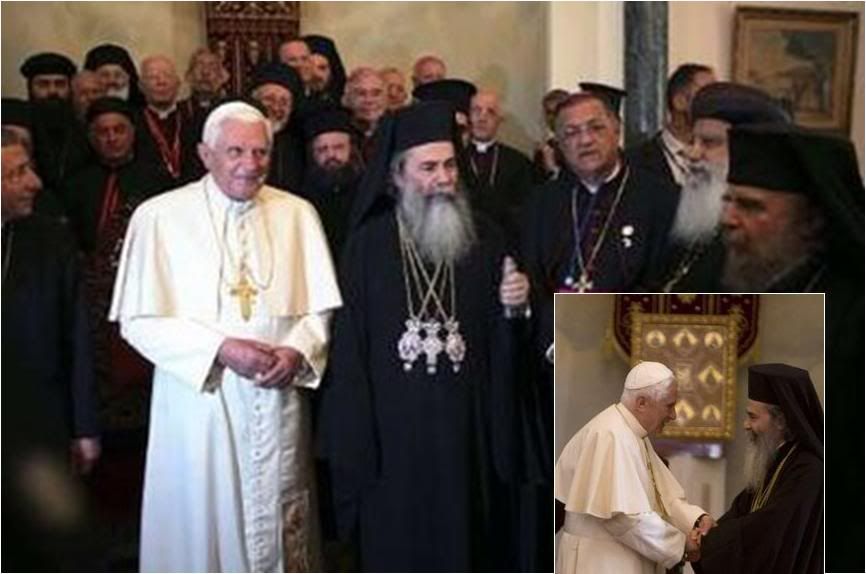
Benedict also met with the city's Greek Orthodox and Armenian Orthodox patriarchs, part of the outreach effort toward Orthodox Christians that he has made a keystone of his papacy.
The Pope is leaving the Holy Land having fulfilled his mission of reaching out to Jews and Muslims, but some are giving his five-day trip only mixed reviews. It was his first visit to Israel and the Palestinian territories as pontiff.
During his visit, he led 50,000 worshippers in a jubilant Mass outside of Nazareth in an effort to rally his flock, whose numbers have been holding steady inside Israel's borders but dropping steeply in the West Bank and elsewhere in the Middle East.
The number of Arab Christians in the Holy Land — an estimated 160,000 — has barely risen in six decades, even as the Muslim and Jewish populations have skyrocketed.
He removed his shoes to enter Islam's third-holiest shrine, and he followed Jewish custom by placing a note bearing a prayer for peace in the cracks of the Western Wall.
He also met Israeli and Palestinian leaders. "It was a trip in which the Pope listened very much. He was also listened to, I think," Vatican spokesman the Rev. Federico Lombardi said.
Benedict won appreciation from Palestinians for endorsing their call for an independent state. But some Israelis were disappointed with his treatment of the Holocaust, saying he could have gone further in a speech at the country's national Holocaust memorial.
The Pope eloquently spoke of the suffering of Holocaust victims but did not follow the lead of his predecessor, John Paul II, in expressing remorse for the Church's historic persecution of Jews. Neither did he discuss what some see as the Church's passivity during the Nazi genocide or his own time as a member of the Hitler Youth.
Those perceived omissions led officials at the Yad Vashem memorial to take the exceptional step of openly criticizing the speech. They also noted he said Jews were "killed," rather than "murdered."
The Pope's final speech before his departure might have been an attempt to address those concerns.
In it, he referred to Jews "brutally exterminated under a godless regime." He also referred to what he called a "tense relationship" in the past between Jews and the Catholic Church.
Addressing Israeli President Shimon Peres, he also explicitly endorsed a "two-state solution" to the Israeli-Palestinian conflict and singled out Israel's West Bank separation barrier.
"One of the saddest sights for me during my visit to these lands was the wall," he said.
Israel began building the barrier during a wave of suicide bombings to keep assailants out of Israel. Palestinians see it as a land grab because its route is largely inside the West Bank.
In Israel, many remember the excitement sparked by the charismatic John Paul when he arrived in 2000 for the first official visit here by a Pope. Benedict's visit seemed to suffer in comparison.
"If history will ever bother paying attention to his inconsequential visit, it will merely be as a footnote to the end of Christian influence in the Middle East," columnist Anshel Pfeffer wrote Friday in the daily
Haaretz.
But Ron Kronish, an Israeli rabbi involved in interfaith dialogue, said much of the criticism was unfair.
"I think overall, from the point of view of the state of Israel and the Holy See, the Vatican, this was a successful trip," he said.
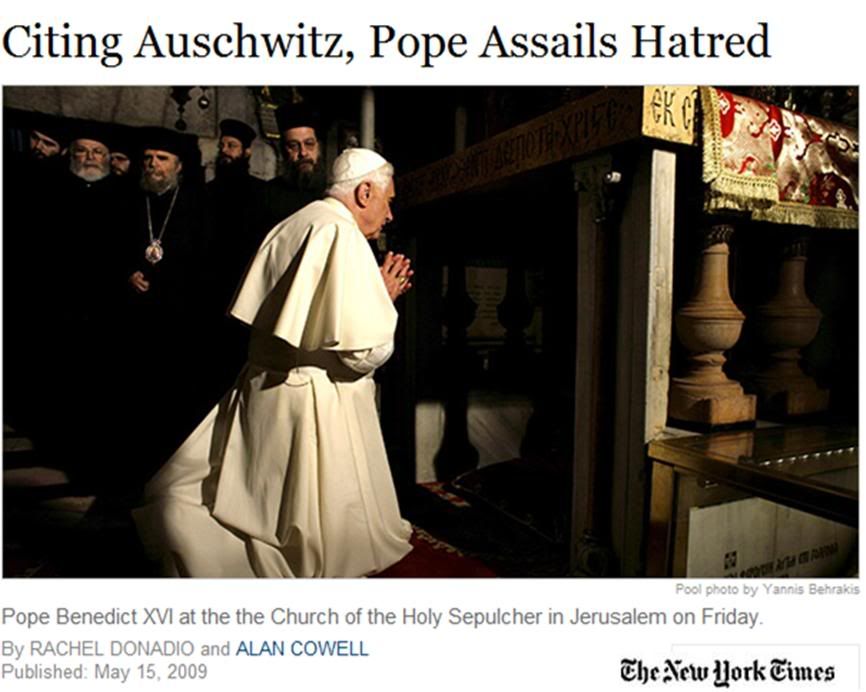
TEL AVIV — Recalling a visit to the Auschwitz death camp, Pope Benedict XVI wound up a sometimes fraught and often politically charged trip to Israel and the West Bank on Friday with a call for peace and a plea that the Holocaust — “that appalling chapter in history” — must “never be forgotten or denied.”
But, as he has since he arrived from Jordan on Monday on his first trip to the Holy Land as pope, he avoided evoking his German nationality and his personal history in Nazi Germany as some Israelis had demanded. Rather, he blamed the Holocaust on “a godless regime.”
The Pope has sought to walk a narrow line between the tripwires of Middle East politics, addressing the concerns of Israelis and of Palestinians.
As he left, he spoke in a farewell statement from Israel’s Ben-Gurion International Airport of the separation barrier that Israel has built to fence itself off from Palestinian areas, saying it was “one of the saddest sights for me during my visit to these lands.”
He added: “No friend can fail to weep at the suffering and loss of life that both peoples have endured over the last six decades. Allow me to make this appeal to all the people of these lands: No more bloodshed! No more fighting! No more terrorism! No more war! Instead let us break the vicious circle of violence.”
But he used his most direct and personal language when he recalled one of his first acts after his arrival here when he visited the Yad Vashem Holocaust memorial and met survivors “who suffered the evils of the Shoah.”
“Those deeply moving encounters brought back memories of my visit three years ago to the death camp at Auschwitz, where so many Jews — mothers, fathers, husbands, wives, brothers, sisters, friends — were brutally exterminated under a godless regime that propagated an ideology of anti-Semitism and hatred,” he said.
“That appalling chapter in history must never be forgotten or denied,” he said. “On the contrary, those dark memories should strengthen our determination to draw closer to one another as branches of the same olive tree, nourished from the same roots and united in brotherly love.”
Earlier Friday, the Pontiff walked into the Church of the Holy Sepulcher in Jerusalem accompanied by a traditional escort of men in black robes and red fezzes rhythmically banging staffs on the ground to announce his approach, The Associated Press reported.
Benedict knelt down and kissed the rectangular stone on which Jesus’s body is believed to have been placed after the crucifixion. Then he entered the structure inside the church marking the site of Jesus’s tomb and knelt inside alone for several minutes, hands clasped, as priests chanted nearby.
In a speech afterward, he told those gathered in the church not to lose hope.
“The Gospel reassures us that God can make all things new, that history need not be repeated, that memories can be healed, that the bitter fruits of recrimination and hostility can be overcome, and that a future of justice, peace, prosperity and cooperation can arise for every man and woman, for the whole human family, and in a special way for the people who dwell in this land so dear to the heart of the Savior,” he said, the A.P. reported.
The language he used in addressing the Holocaust in his farewell remarks later seemed less emotive than in May 2006, when Benedict prayed at the cells and crematories of the Auschwitz camp on a visit he called “particularly difficult and troubling for a Christian, for a pope from Germany.”
“Words fail,” Benedict said at that time. The Pope was born Joseph Ratzinger in Bavaria in 1927. The son of a policeman, he was inducted into the Hitler Youth and the German Army — biographical details that he has not recalled during his Middle East journey but that some Israelis have.
[It's not as if he has ever hidden those facts. They just are not relevant. How can he presume to cite his own experience of the war as a teenager conscripted into German military service, compared to the unspeakable horror which was the lot of six million Jews?
If he had done so, he would have been even more criticized for bringing himself into the discussion of the Shoah. As it is, out of consideration for his hosts, he made no reference - as he could have - to all the Catholics who were murdered by the Nazis simply for being Catholic, victims of a 'godless regime' as much as the Jews were. But again, Israel is not the place to say that, and there will be Jews who will scorn the reference, anyway, saying there can be no comparison because the numbers just don't match at all.
Thank God for Benedict XVI who says what he believes is right and appropriate no matter what the pressures are on him to be 'accommodating'.]
“In the end, there can only be a dread silence, a silence that itself is a heartfelt cry to God,” Benedict said in 2006. “Why, Lord, did you remain silent?” he said, his voice trembling. “How could you tolerate this?”
At that time — one year into his papacy — he did not seek forgiveness for Germans or the Roman Catholic church during World War II. He laid the blame squarely on the Nazi regime, avoiding the painful but now common acknowledgment among many Germans that ordinary citizens also shared responsibility.
In 2006, he said he went to Auschwitz “as a son of the German people, a son of that people over which a ring of criminals rose to power by false promises of future greatness and the recovery of the nation’s honor, prominence and prosperity, but also through terror and intimidation.”
[And what would it have served to reproach Germans today with the sins of the past - even if many ordinary Germans were complicit with the Nazis at the time? The Pope's reproach was for all evil such as the Nazis did, whoever does it, in whatever place and at whatever time.
The world itself has not laid the blame for the Nazi crimes against humanity on Germans in general - the international community tried those that it could at Nuremberg, and allowed the rest, including ex-Nazis, to start anew and rebuild their nation, even helping them to get on their feet with the Marshall Plan.
As a German private citizen, Joseph Ratzinger is not in the same position to speak for all Germans, the way John Paul II was, as Pope, to speak in behalf of all the Christians who had sinned against their fellowmen by persecution, violence and abuse in the past. And the distinction should be obvious.
No one elected Joseph Ratzinger to represent the German people and speak for them. He can only speak for the Church which he represents and heads, and for his own personal convictions.
It's such an outrage for Donadio to dredge up the polemics over the Auschwitz address of 2006 the way she has done!]
But the Pope’s attitude to the Holocaust resonated strongly during his visit here, just four months after he provoked outrage by revoking the excommunication of four schismatic bishops, one of whom, a Briton, Richard Williamson, has denied the scope of the Holocaust. Benedict’s words on Friday seemed a direct rebuttal of attempts to minimize or deny the Holocaust.
The Pope’s visit has rarely been free of a political edge. On Thursday, the Israeli prime minister, Benjamin Netanyahu, urged him to denounce Iran.
A day earlier, the Pope visited a Palestinian refugee camp, calling for the creation of a Palestinian state — a policy not endorsed by Mr. Netanyahu’s hawkish Likud Party.
In his departure remarks, Benedict repeatedly referred to the stark symbolism of the separation barrier built by Israel beginning in 2002. He crossed the barrier in his motorcade when he visited Bethlehem, the biblical birthplace of Jesus, on Wednesday.
“As I passed alongside it,” he said, “I prayed for a future in which the peoples of the Holy Land can live together in peace and harmony without the need for such instruments of security and separation, but rather respecting and trusting one another and renouncing all forms of violence and aggression.”
Rachel Donadio reported from Tel Aviv, and Alan Cowell from London.
[Modificato da TERESA BENEDETTA 15/05/2009 18:34]